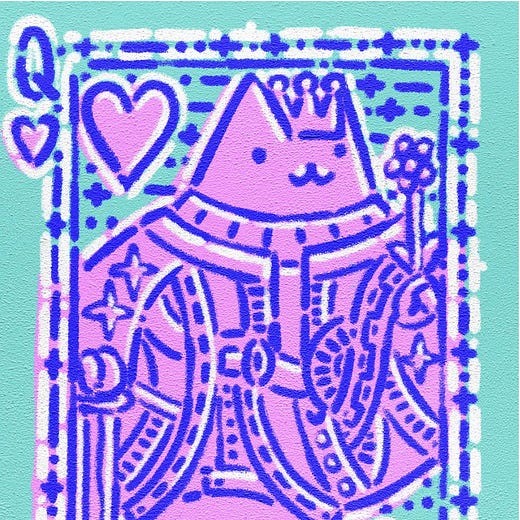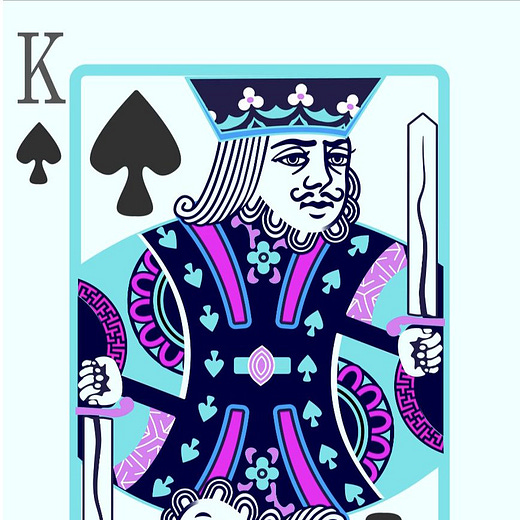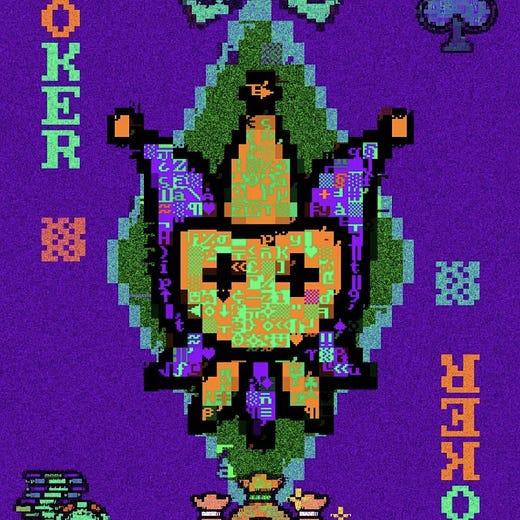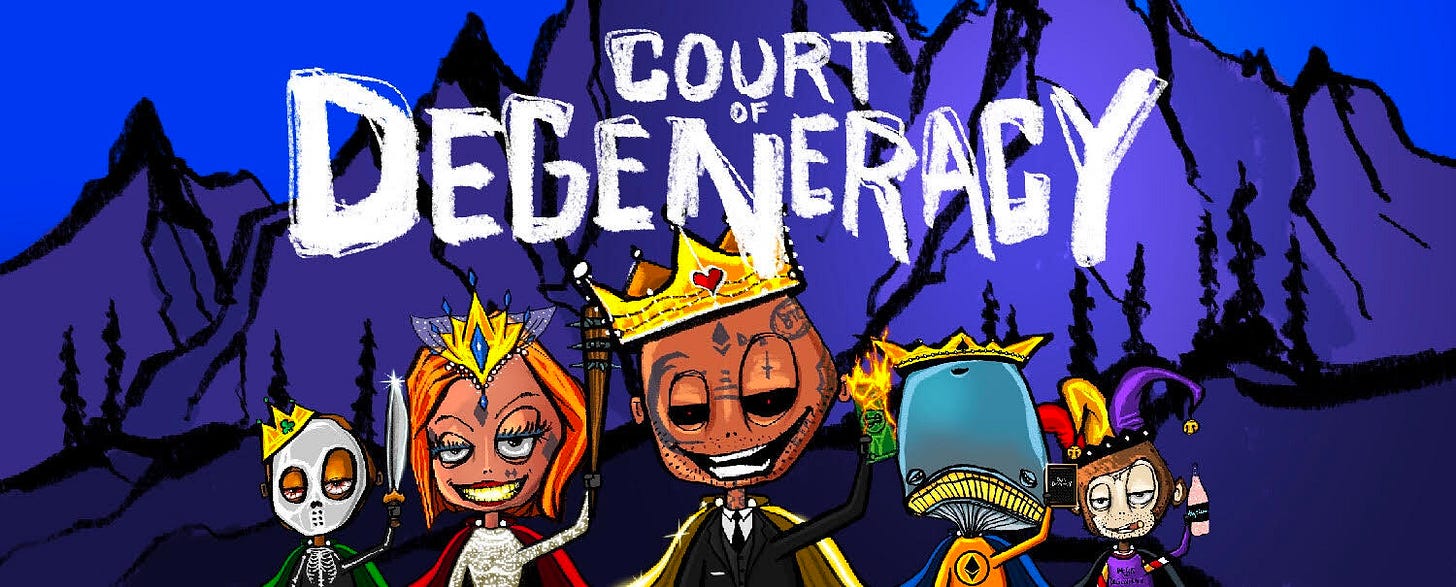A Chat with Poker Pro Jonathan Little
Professional Poker Player Jonathan Little discusses his NFT projects, his poker coaching website, poker tips for beginners, what he's struggling with right now, and more.
A big woof to new readers of The Monty Report who have joined since the last Report went out! If you’re new around here, please join our growing squad of inquisitive, kind, and degenerate readers by subscribing here for free:
If you stumbled across this post and you’re not sure who I am, check out my Twitter, @montymedici, and my archive.
Hi Everyone -
Recently I sat down with Professional Poker Player and NFT collector and entrepreneur Jonathan Little.
He joined me from his home office in New York City, just days before he left to the Bahamas for a poker tournament.
We had a fun conversation, and discussed his NFT projects, his poker coaching business, poker tips for beginners, what he's struggling with right now, and much more.
Jonathan also generously offered to giveaway three pieces of work from his Deck of Degeneracy Art Collection.
This giveaway is only available to subscribers of The Monty Report who were subscribed before this interview went live. If you are interested in one of the pieces, please reply via email with the subject line “DoD Art.” I will randomly select three people for the giveaway. Deadline is Thursday, February 2nd and 11:59 PM PST.
Enjoy!
Monty
A conversation with Jonathan Little
I would just love to hear a little bit about your childhood. Where did you grow up? What was your childhood like?
I was born in Pensacola, Florida to a middle-class family. I was always taught to “go to school and get a degree.”
I was always into games. I played a lot of chess as a kid. Then once I got into middle school, I started playing a lot of Magic: The Gathering, which has a lot of similarities to the NFT space, because there are game pieces that are valuable that also have utility in a game.
That was a training ground to some extent for my NFT experience many, many years later.
I never really had any clear direction for what I wanted to do when I grew up, but I knew I liked playing games, and I knew I was good at playing games. Games took up most of my spare time.
I would wake up at 4 AM every morning and play games on the computer before it was time to go to school, and I would play Magic: The Gathering tournaments most days after school.
Were you playing all your games in person? Online? Was internet gaming even a thing when you were a kid?
This was around 1992 to 2000, something like that. I was playing online chess back then. I would play on the site called Pogo which may be still around, I don't know [Editor’s Note: It is]. I played speed chess in the morning. I played Diablo. Then I would play Magic: The Gathering with friends.
What does a day in the life of Jonathan Littell look like today?
I have three relatively different lives.
Roughly one week per month, sometimes more, sometimes less, I will travel to play a high-stakes poker tournament series. This coming week, for example, I'm going to go to the Bahamas for about two weeks. Every day, there is a relatively big buy-in poker tournament I will play.
While I’m there, I'll wake up and do whatever business stuff I have to deal with, try to get in the gym so I can be in good physical and mental shape, have some good food, and then I will play poker all day until about midnight. Then I'll go to bed and wake up and do it again for about two weeks straight. That's the poker grind.
I don't do the poker grind as much as I used to. Seven or eight years ago I made a point to stay home more because I wanted to have a family. Now I have a wife and two young sons and it's good. But I still do poker about one week per month.
My other job is being a dad and taking care of my kids, who are four years old and six years old. During the week they're at school, and on evenings and weekends, I hang out with them. We like to do fun things around New York City where we live.
Then, during the weekdays I work mostly on my training site, Poker Coaching, which is a full-time job. We have a bunch of coaches, and I’m managing a lot of different things and making sure nothing falls apart.
Then I have my NFT projects: Deck of Degeneracy, which has been out for a while, and Court of Degeneracy, which is launching soon.
That’s a lot to manage.
My wife always comments that she didn't realize before I got into NFTs a few years ago that this was going to be another full-time job. It turns out it is, but it's a lot of fun. I love it.
Do you remember the first NFT you ever bought?
Yes. It must have been March 2021. One of my friends who was helping me with my poker coaching site said he was coming to New York City to attend a party where they were going to watch the Christie's Auction of some Cryptopunks.
So I went to this party. I didn't know anyone there. But I learned about Cryptopunks. The next day, I bought two punks.
Do you still have those punks?
No, I've been in and out of Cryptopunks. I had to sell those ones to pay my taxes. But Cryptopunks have been good to me.
Let’s talk about your growing NFT empire. So there's the Deck of Degeneracy. Then there's the Deck of Degeneracy Art Collection. And then there's the forthcoming Court of Degeneracy PFP collection.
For newcomers to this world, it might be a little confusing. So let's just take them one by one.
Can you tell me about the Deck of Degeneracy? What it is, and how does it work?
I have a bunch of NFTs myself and I'm involved in a lot of projects. I have learned the things that I like in projects and the things that I do not like.
For example, I do not like to have to pay attention to a bunch of announcements. But I really, really hate missing out on value. So I wanted to be sure that whatever value my project delivered to holders, they don't actually have to pay attention if they don't want to.
With Deck of Degeneracy, I made 50 decks of 54 playing cards. 2700 NFTs total. Then every two or three days, I pick a card at random from a physical deck, on a video. If you have one of the 50 copies of that card, you win whatever the prize is.
Initially, the prizes were just pieces of my poker tournament action. So if I go to play poker, those cardholders will each get 1% of whatever I win in that tournament. After I released the collection, I got fortunate at the second tournament I played, and I won second place for $150,000. We then sent out 1% times however many people had the card, which I think was the nine of spades. So we sent out $1,500 to all the holders of the nine of spades.
I also do other prizes. I've collected a ton of NFT art, and I have asked some of my artist friends - “Hey, what would it take to get a piece made that I can then make an edition of roughly 50 copies that I can then give to holders of a random card?”
It turns out, many of the artists were happy to help me because I've supported them over the last year and a half - some of them gave me pieces for free or relatively cheap compared to whatever their normal price is. Fast forward almost a year later and now we have about 220 pieces of art that we either have given away or will be given away soon, all in the form of airdrops, to holders of the Deck of Degeneracy cards. This is the Deck of Degeneracy Art Collection.
I think we've had about 120 ETH in secondary sales on the Art Collection, which is good for an airdrop collection. It’s a lot of fun. I love art, I love sharing art.
Are there any benefits to holding certain cards from the Deck of Degeneracy? In other words, besides the random drawings, are some cards better than others for any reason?
In general, it’s a little bit better to have a low card or a high card. In some of the drawings we play various poker hands, and then we'll play it so that either the highest hand wins or the lowest hand wins. For this reason, the high and low cards might be drawn more often than the middle cards.
There are also gold cards. There's one gold card for every card and those get doubled utility. So 2% instead of 1% of my poker action, or two art pieces instead of one.
Got it. Now tell me about the forthcoming Court of Degeneracy PFP Collection.
I learned a lot of stuff in the process of making the Deck of Degeneracy. One of the things is that I incentivize people to hold a lot of cards. There are multiple people who have an entire deck of cards, but there are only 50 decks of cards. So, inevitably, that limits the size of the project’s community. I think we only have something like 550 holders, which is not a lot of holders in the grand scheme of things. I was curious about how to create a bigger community in my next project, for the project to really thrive and get bigger.
I like for people to be able to get full value out of my projects. So I decided to figure out a way to make a profile picture project where specific traits give specific utility. Court of Degeneracy is going to be 10,000 pieces. They're all profile pictures, where some of the traits have utility. Like if you have a character with cards in it’s hand, you'll be able to play our poker freeroll.
So people will either mint one with the cards in their hands if they want to play the poker free roll, or buy, or trade, or whatever in order to get a hold of another card, because that gives them the utility that they want.
Every Deck of Degeneracy holder is going to be able to mint for free - one for every card they hold. Then we're going to have an allowlist that will receive early access and a cheaper minting price, and then we will sell the rest to the public after that.
Do you know the allowlist price?
.0888 ETH. Whereas the mint price will be .1 ETH, so a little bit of a discount.
Do you know when this is launching?
Soon. The art is finished. The website's almost finished. We are at the stage where we will be getting a list up and running very soon.
If you would like to join the allowlist for the Court of Degeneracy, you may do so here.
Jonathan reserved up to 250 spots for readers of The Monty Report.
Okay, let's talk poker. So you run Poker Coaching. Who should visit this website, and what should they expect to find there?
Anyone who wants to learn how to play poker well should visit Poker Coaching.
If you don't know anything about poker, I have a free three-hour crash course that will get you better than most of your friends.
A lot of the content is designed to be easily consumable, where you watch a 10-minute video and then you get a few quiz questions to be sure you understand what you just watched.
The Fundamentals Course will get you up to being decently competent to where you can play pretty well and know more than most people about poker.
From there, we have over 200 hour-long courses called The Tournament Masterclass and The Cash Game Masterclass. Those are very in-depth, those will teach you all of the common scenarios for both cash games and tournaments.
Then, from there, we have a bunch of other content on very specific aspects of the game, like when you should be bluffing on the river, for example.
You can go through and find whatever topic or whatever issues are giving you trouble.
We also have about 1500 interactive quizzes, where we essentially put you in a poker hand and then ask you what you would do on each betting round. Before the flop comes, you say what you would do in this scenario, and then you'll get feedback - we will say which plays we like, and which plays we don't like, and give you a score. Then you'll go to the next betting round.
If you go through a bunch of these, you'll start to find scenarios where you play well and where you probably don't need to devote too much attention. But you will also find spots where you play poorly. Then you can go through and thoroughly study those scenarios so that you get better at those weak spots.
We also have a lot of game theory optimal charts for cash games for tournaments that will tell you how to play well before the flop so that you don't even have to really worry about making errors at that stage of the game because those situations have been relatively close to solved. Poker before the flop is not that difficult of a game.
It gets difficult on the later betting rounds, but before the flop, we have charts that will tell you what to do, which makes your life easy.
There’s a bunch of other stuff too, and the best way to experience it is to go to the website. If you sign up for one of the paid plans and you don't like it, send us an email, and we’ll give you a 100% money-back refund. If I do not help people improve at poker, I do not want or deserve their money.
What are the most common mistakes that you see beginners make?
People are usually either too aggressive and splashy, they want to play too many hands, or the opposite - they're too weak and tight.
People make all sorts of mistakes. Some players will bet every single time no matter what they have, no matter what the flop is, because they've read somewhere that their opponent is only going to connect with the flop about a third of the time, which means two-thirds of the time, you're not going to have anything - which to some extent is true. But you also have to realize that two-thirds of the time, they're not gonna have anything either.
When you go to tournaments, are your opponents people that you're going to be meeting for the first time? Or are they players you're already familiar with? Do you study their games in advance? Or do you just have to learn on the fly at the table?
It's a little bit of both. It depends on the type of tournament. At the tournament in the Bahamas, they run various promotions to let people get into this tournament. So I'm not going to know a whole lot of people in the main event, the $5,000 buy-in tournament. But there’s also another $25,000 buy-in tournament, which will be a much smaller group of people. So I'm going to probably know 95% of the people in that tournament.
Most good poker players keep a document in their phone with reads on particular players or hands they played that are worth noting. I reference that every single time I go to sit down at the table, because I likely have not played with these players in six months or more. I don't know what happened six months ago, but my document does. That allows you to generate reads to some extent.
It's also worth noting that you need to know what bad poker is in order to pinpoint it right. And this is why studying is very important. At Poker Coaching, in the 40-hour long courses, we will teach you what good strong game theory optimal poker looks like. Then if you see your opponents doing something that's clearly not optimal, that means they're messing up most likely. If you can see they're messing up, then it's usually not too hard to figure out the logical counter-strategy. But if you don't know what bad poker looks like, then you won't be able to logically adjust because you don't know what they're actually doing wrong.
Is there a difference between online and in-person poker, in terms of how you play?
When you're playing online, you have fewer reads to go off of because you cannot look at your opponent and tell if they have a good hand. Online players tend to be a whole lot better than live poker because you play many more hands per hour online than you do live, just because there's no shuffling. Plus you can play multiple tables at a time. So that results in online players being substantially better than live players.
This forces you to play closer to a game theory optimal strategy online compared to live. As your opponents play better and better, your goal as a poker player becomes to play as close to the game theory optimal strategy as you can because you don't necessarily know what your opponents are doing wrong. They may be doing something wrong, but it's usually pretty hard to pinpoint.
But if you're playing live poker and you see your opponent limping every hand, which is clearly not good poker, it usually becomes very obvious very quickly what they're doing wrong. A lot of these players have not played so much poker to the point where their errors become obvious to them. If they play once every month, and they just happen to lose once a month, and it's not for a lot of money, they may just not care. Whereas if they're doing it all day, every day, they're gonna go broke very quickly, right?
Big poker tournaments start in the morning, then they go on until late at night. How do you stay focused and maintain your mental game during these long marathons?
When I played chess, as a kid, sometimes games took a long time. When I would go to Magic: The Gathering tournaments, those would take six hours at a minimum. So I've been training for many, many years to sit down and play my game well. If you do not play your game well, then for a long period of time you lose, and I don't like losing.
So how do I do it? I've practiced a lot. I set myself up for my best attention span. I'm not browsing Twitter, on my phone, whenever I'm playing poker, because then I’m not paying attention. I try to not watch whatever they put on the TVs during the poker tournament because that will distract me. I try to take care of whatever business stuff I have to deal with before the poker tournament, so I’m not thinking about it while I'm at the table. I do the little things that allow me to more easily focus.
Something I do that I think a lot of people don't do is that every time I am in first position, under the gun at the poker table, after I fold, I'll just get up and walk around. I'll look at everybody's chip sacks. I know how many chips everybody has, but I also kind of ignore the rest of the hand, which gives me a little bit of a break. I also make a point to try to eat healthy stuff. And I make a point to not be too tired and get my sleep.
“Like in poker, you need to have good bankroll management in NFTs.”
Is there anything in your life that you're struggling with right now?
I probably buy too many NFTs. I'm pretty quick to ape in. Like I went big into 6529 Meme Cards over the last month. I thought they'd be good and turns out they were good. Is that a bad thing? I don't know. I probably have a bit of an obsessive personality, and I'm happy to do whatever study is required. I'm happy to look at various things and try to make good decisions. Sometimes that runs me out of ETH though.
Like in poker, you need to have good bankroll management in NFTs. And sometimes I'm a little bit too inclined to go all in. For example, at the end of the year I thought it would be a good time to pick up a lot of illiquid one-of-ones from people looking for tax losses. So I got a nice discount. But I also own a bunch of illiquid JPEGs - which may be a bit of a problem. I'm gonna have to figure out what to do with those eventually.
I think you're stating a problem a lot of readers will relate to.
You always want to keep some liquid ETH or money to use to buy stuff because you never know.
This came up a while back when Gazers had just launched. One of my good friends who loves Art Blocks said, “Look, you need to buy all of these you possibly can.” At that time, they were going for .15 ETH. I had .5 ETH liquid, everything else was locked up.
I bought a few Gazers and I ended up selling them all along the way. So it's okay, I still won, but that's a good example of a spot where if I just had more liquidity I would have been much more aggressive, and I would have done substantially better there. So always recommend to people to try to not be all in on something. And to keep liquid money waiting for the right thing. I realize this is so difficult to do in the NFT space.
That's important advice and staying liquid takes a lot of patience. But I have learned that even when you feel like you've missed out, you haven't, because there's always the next thing.
Yeah, you never know what it's going to be. I mean, something that also feels kind of bad is selling on the way up, right? Because you never sell at the peak. Gazers are a very good example, where I think I sold one for 6 ETH and one for 12 ETH, and then one for 40 ETH. I don't know where they're going, they're probably going to 1000 ETH. Who knows.
But you can't feel bad about locking up a win, especially when the project kind of plateaus at some point. This happened to Board Apes as well, where they got to 6 ETH, and they stalled for many months. Then I dumped some of them at 16 ETH. I kept only one and then they went to 100 ETH or whatever. Then I sold my last one.
Also, make sure you set aside money for taxes. Do that.
Otherwise, you're going to have to sell your crypto punks.
Yes, that's exactly right.
So I read that when you were feeling stuck early in your poker career, you hired a coach to help you. Do you still have a poker coach?
I've always hired coaches for most things I want to get good at in life. I’ve realized the coach has spent their life getting good at something. If they can figure out exactly what I need to hear to make me better at this thing, whatever the activity is, that's going to be very high value. Anytime I want to learn something new, I will hire a coach.
A lot of NFT people like to play poker. I've made a point to be active in the poker community. People know me from poker, so they are happy to help me with NFT information and I help them with poker information. That's incredibly valuable because now I just get these mentors who are good at this activity. I would recommend to most people, if you're good at something, try to find a way to use that skill to help people who are good at the thing that you want to be learning because then it's a trade. That's very, very valuable.
Beyond just financial wealth, what does a “rich life” mean to you?
I suppose being able to do whatever you want, whenever you want to do it, within reason, right? And that's a tough thing because I think a lot of people, myself included, probably end up working too much.
At the same time, I love what I do. So is it really work? I'm not so sure. But at nighttime, when I should be hanging out with my wife and kids, sometimes I'm on my phone, looking at Twitter, making sure I don't miss anything. I'm running off to the computer to mint something because I have to be at the computer at 8 PM sharp to mint something. And is that ideal? I don't know. Probably not. But I suppose I'm not rich enough yet to not be able to get the good mints.
Alright, let's run through some rapid-fire questions to finish up.
What are your favorite card games that aren't poker?
Magic: The Gathering. I also play the game Hearthstone every once in a while, which is something I've had to wean myself off of as well. It's a strategy card game, kind of like simple Magic: The Gathering.
What do you have for breakfast this morning?
I had a giant smoothie made with spinach and kale and parsley and carrots and blueberries and chia seeds. I have that basically every morning. I make that for my wife and kids. Then we had a yogurt parfait with some granola and some blueberries. Sometimes we do some sandwiches in the morning like turkey sandwiches with cucumbers. Sometimes we do oatmeal. But always the giant green smoothie.
Do your kids like the green smoothie?
They do, they love it. Our kids are very good eaters. I think we either got lucky or they just know they have no other option besides the green smoothie.
You have a bookshelf behind you. Any book recommendations that come to mind?
The Four Hour Workweek by Tim Ferriss, I read that a long time ago. That gave me a lot of tools and resources and thought processes to figure out ways to be very efficient with time. My goal is not to work four hours a week, the goal is to be able to put in 10 weeks’ worth of work in one week. That book was very beneficial for helping me become efficient.
That book is useful in terms of learning how people who scale things think. In poker, you can only make so much money because you only make money when you're playing. The most money you're gonna make from playing poker is something like $200 per hour, which is good money, don't get me wrong, but it's not “get super rich” money. To do that, you have to figure out a way to scale whatever skills you have, which is part of why I made a poker training site, because I can take all of my years of knowledge and share it with thousands of people. If you help out people a little bit, they're happy to give you a few dollars, and a few dollars for many thousands of people is a lot of dollars.
What are 1-3 pieces on your “grail list” to acquire if you have a chance?
I'd like to get an Alien Queen piece. I like her pieces a lot. I don't have any of her one-of-ones. I've tried to get some a few times and I've failed.
Jake Fried, I'd love to get a one-of-one.
I'd like to get an OSF one-of-one at some point in the future, too.
You've traveled a lot for poker. What are some of your favorite cities you've ever been to?
When you play poker 12 hours every day, you don't really get to get out to the city. I like going to the Miami area, they have a big poker tournament there every 2-3 months actually. Barcelona is a fun place. It's a great city. Melbourne, Australia is a cool place. They have very good breakfasts there. So if you wake up at 9 AM you can go get some amazing breakfasts.
What do you have for breakfast in Melbourne?
Regular food man, just like eggs but it's just way better. Their coffee is way better too, I don't know what the difference is. But the coffee is way better there. So that's a good place to go.
Thank you for reading!
I encourage you to follow Jonathan on Twitte @JonathanLittle
You may find links to Jonathan’s projects here:













